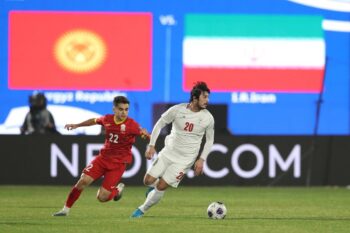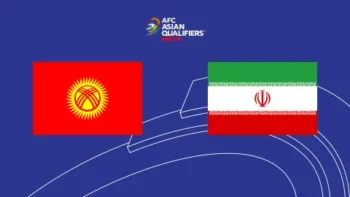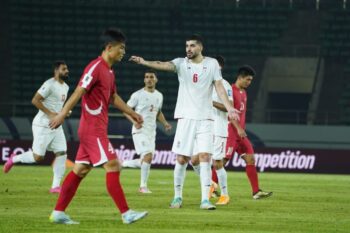Ghotbi aims for lasting legacy
 AFC – DOHA, His homecoming may have been brief but Afshin Ghotbi is hoping that his two-year reign as head coach of Iran will leave a lasting legacy that the country can build on for the future.
AFC – DOHA, His homecoming may have been brief but Afshin Ghotbi is hoping that his two-year reign as head coach of Iran will leave a lasting legacy that the country can build on for the future.
Ghotbi, who took charge of Team Melli in April 2009, will be leaving to coach J.League side Shimizu S-Pulse after the conclusion of the AFC Asian Cup Qatar 2011™.
Despite revealing his plans to leave for Japan after the tournament, Ghotbi is confident that he can leave Iran on a winning note. But perhaps more importantly, the 46-year-old believes that he has helped to lay a foundation that will help to improve Iranian football.
“I think that Iranian football has had a lot of ups and downs in the last 30-plus years,” he told www.the-afc.com.
“If you look at it, there’s a lot of talent and there’s a lot of passion for the game but there really hasn’t been a system or an infrastructure to build the players and give them the right education.
“There hasn’t been the atmosphere to build coaches with the right education to develop the game.
“But hopefully as the doors are opening and the windows are opening, the football will benefit from the technology and the education that is available around the world. And more Iranian players and the younger coaches who have been played abroad, maybe they can bring their experience to help Iranian football.
“Iran in its history has only been in the World Cup three times and only won one official game in the finals. So we haven’t on the international stage, really achieved the results that we should achieve.
“We want to change that in this Asian Cup.”
Korea highlights
This year’s AFC Asian Cup marks the second outing for Ghotbi in the tournament.
However, it is the first time that he has been involved in the event with Iran after serving as an assistant coach for Korea Republic at the last tournament in Southeast Asia.
And while he admits that he still has a strong affinity for the Koreans, it is an extra special feeling for him to be leading the country of his birth into Asia’s premier football tournament.
“When I worked for Korea, I worked there for a long time – I worked for two World Cups and one Asian Cup and I was also a coach for Suwon for two years – so I really felt a very close bond with the Korean people and a great national team and also the Korean players.
“But having said that, there is a different feeling of working for Iran because I was born there and I feel a very deep connection to the Iranian people and to the Iranian national team.
“So to work for my national team, the country where I was born and where my roots and heritage are from is an honour.
“And I feel like it’s a service that I’ve really enjoyed and it’s an honour that I will never forget in my life. So that’s why I hope that we can get the right results.”
Having left Iran for the United States as a 13-year-old, Ghotbi spent three decades away from his homeland before returning there in 2007 to take charge of Iranian league giants Piroozi (Perspolis).
“It was an interesting feeling, to come back after 30 years and seeing everything a little bit different. The country had changed and the culture had changed. Even in the language, I could see a bit more of an Arabic influence in it,” the Shiraz-born Ghotbi recounted.
“But with the deep emotion of being an Iranian with the Iranian people, there was an immediate connection. And having been the head coach of the biggest club in Iran and going 18 games undefeated really created an enormous energy and a positive atmosphere for me.
“And the connection with the Iranian people became even deeper, possibly because I brought a different management style and personality to Iranian football. Added to that, winning games created a great bond between me and the Iranian people.”
Despite leading Piroozi to the league title in his only full season in charge, Ghotbi quit the Tehran club in 2008. But he returned to his homeland early the following year to take over as the national coach after the brief reigns of Ali Daei and Mohammad Mayeli Kohan.
Ghotbi failed to lead Iran to the FIFA World Cup 2010 but he successfully navigated them through the AFC Asian Cup qualifiers while also overseeing a period of generational change as the international careers of veterans like Ali Karimi, Mehdi Mahdivikia and Vahid Hashemian came to an end.
But in addition to blooding the youngsters for the current national squad, the Iran coach is also keen to leave something that his successors to build on.
“My feeling is that sometimes it’s very difficult to create those stars on a regular basis but that’s where the education in football comes – to identify the right talent and to give them the right education and environment to grow and to create a competition within the group and build the connection between the clubs and the national team.
“It’s a long discussion but I have tried in my 21 months as head coach of Iran to discuss these things with the president of the Federation and the technical committees to try to create more of an infrastructure to build the future of the game.
“You look at my roster and I have players that are in the Olympic team and are 21 years old. Most coaches wouldn’t have given them a chance but that’s a little bit of my ambition – as I’m trying to build the present national team, I’m also thinking about the future even if I’m not going to be part of it because I’m leaving after the Asian Cup for Japan.
“But because it was the country I was born in, I care about it and I want to build a future for it.”




